高中英语语法教案名词
高三英语一轮复习语法第1讲名词的数格构词法考点讲义
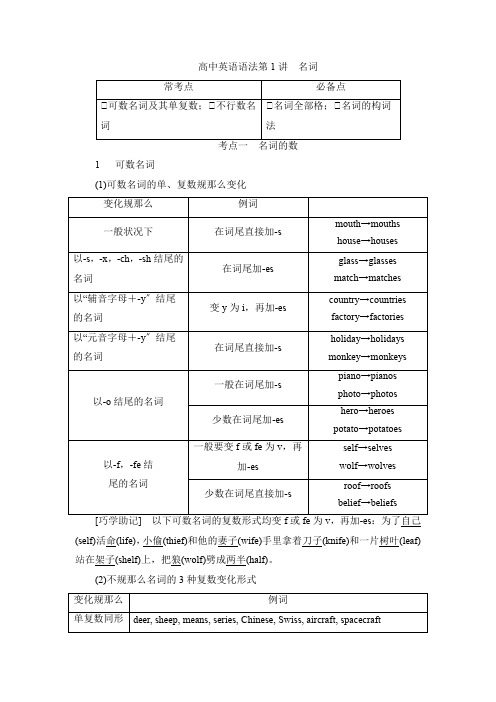
高中英语语法第1讲名词1 可数名词(1)可数名词的单、复数规那么变化:为了自己(self)活命(life),小偷(thief)和他的妻子(wife)手里拿着刀子(knife)和一片树叶(leaf)站在架子(shelf)上,把狼(wolf)劈成两半(half)。
(2)不规那么名词的3种复数变化形式一种鱼时,其单复数形式相同。
(2)people指“人们〞时单复数同形;指“民族〞时,其复数为peoples。
(3)合成名词的2种复数形式①假设有中心词,那么把中心词变成复数;假设无中心词,那么把最终一个词变成复数。
passerby→passersby, sisterinlaw→sistersinlaw, grownup→grownups①“man/woman+n.〞变复数时,作定语的man/woman和中心词都要变复数,如women engineers。
对点练1写出以下名词的复数形式①sheep—sheep①dish—dishes①knife—knives①story—stories①tomato—tomatoes2 不行数名词(1)常见的不行数名词一般来说,物质名词和抽象名词是不行数的,因此没有复数形式,一般也不能用a或an修饰。
通常只用作不行数的名词有:milk, music, homework, housework, weather, news, butter, information, bread, advice, progress, orange(橙汁), meat, equipment, fun, luggage, luck, work(工作), traffic, furniture, wealth, word(消息), room(空间), man(人类)等。
[名师点津]word意为“消息〞、room意为“空间〞、man意为“人类〞时,通常不带任何修饰词。
英语语法-名词-教案

一、名词(一)定义表示人、事物、抽象概念等名称的词。
我们通常称为名词。
例如:teacher, desk, Japanese, milk 等。
(二)分类总的来说, 英语中的名词可以分为专有名词和普通名词两类。
1. 专有名词:表示人、地方、事物、机构、组织等专有名称的名词。
例如:Lucy, Shanghai, the Communist Party of China, the United States等。
注意:专有名词的第一个字母要大写。
2. 普通名词:表示某一类人或事物或表示一个抽象概念的名称的名词。
例如:worker, boy, machine等。
普通名词又可分为以下四类:(1)个体名词:表示个体的人或事物的名词。
例如:cup, desk, student等。
一般可数, 有单复数形式。
(2)集体名词:表示一群人或一些事物的总称的名词。
例如:class, team, family等。
一般可数, 有单复数形式。
(3)物质名词:表示无法分为个体的物质或材料的名词。
例如:rice, water, cotton等。
一般不可数, 没有单复数之分。
(4)抽象名词:表示状态、品质、动作、情感等抽象概念的名词。
例如:love, work, life等。
一般不可数, 没有单复数之分。
(三)名词的数(七上Unit 6)可数名词的复数形式的构成规则1. 一般情况下在名词的词尾加s, 如:book -books, pencil-pencils。
2. 以-s, -x, -ch, -sh结尾的名词加-es, 其读音为[iz]。
如:bus-buses, box- boxes, watch -watches, dish- dishes等。
3. 以-y结尾的名词:(1) 以“辅音字母+y”结尾的名词, 把y改为i再加es, 读音为[iz], 如:factory -factories, company -companies等。
(2) 以“元音字母+y”结尾的名词, 或专有名词以y结尾, 直接在词尾加-s, 读音为[z]。
高中英语Unit1TheworldofoursensesSectionⅢGrammar——名词性从句(Ⅰ)教案(含解析)牛津译林版必修3

Section ⅢGrammar——名词性从句(Ⅰ)名词性从句相当于名词,可分别作主句的主语、表语、宾语和同位语。
因此,名词性从句分为主语从句、表语从句、宾语从句和同位语从句,都不能用逗号与主句分开。
When we will start is not clear.(主语从句)我们何时动身还不清楚。
Mrs.Black won't believe that her son has become a thief.(宾语从句)布莱克夫人不相信她的儿子成了一个小偷。
My idea is that we should do it right now.(表语从句)我的意思是我们现在就开始做这件事。
I had no idea that you were her friend.(同位语从句)我不知道你是她的朋友。
一、引导名词性从句的连接词二、主语从句1.主语从句是在复合句中充当主语的从句,通常放在主句谓语动词之前或由形式主语it代替,而本身放在句子末尾。
主语从句通常由连词that和whether、连接代词或连接副词引导。
2.that在句中无词义,只起连接作用,在口语和非正式文体中可以省略,但that从句位于句首时,连词that不能省略。
3.连接代词和连接副词在句中既保留自己的疑问含义又起连接作用,在从句中充当成分。
That the football match will be put off is certain now.足球赛将会推迟一事现在已经确定。
Whether he will come or not is still a question.他是否会来仍然是个问题。
Whoever breaks this law deserves a fine.违反该法者应予以罚款。
When the plane is to take off has not been announced.飞机何时起飞还没有宣布。
It is known to all that light travels in straight lines.众所周知,光沿直线传播。
高中英语语法名词
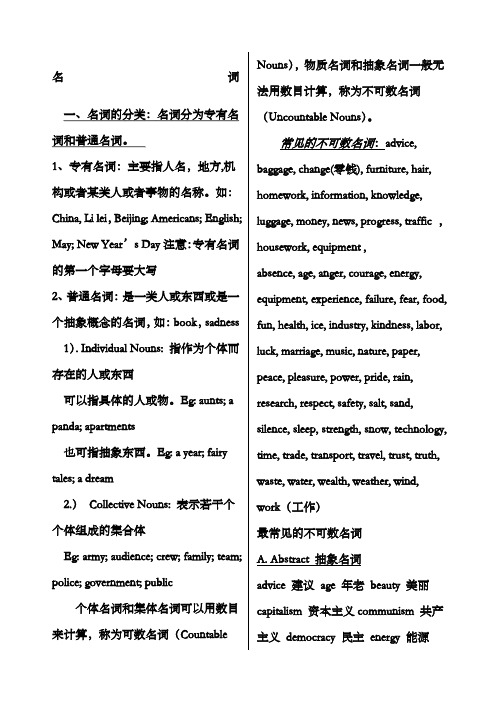
名词一、名词的分类:名词分为专有名词和普通名词。
1、专有名词:主要指人名,地方,机构或者某类人或者事物的名称。
如:China, Li lei,Beijing; Americans; English; May; New Year’s Day注意:专有名词的第一个字母要大写2、普通名词:是一类人或东西或是一个抽象概念的名词,如:book,sadness 1). Individual Nouns: 指作为个体而存在的人或东西可以指具体的人或物。
Eg: aunts; a panda; apartments也可指抽象东西。
Eg: a year; fairy tales; a dream2.)Collective Nouns: 表示若干个个体组成的集合体Eg: army; audience; crew; family; team; police; government; public个体名词和集体名词可以用数目来计算,称为可数名词(Countable Nouns),物质名词和抽象名词一般无法用数目计算,称为不可数名词(Uncountable Nouns)。
常见的不可数名词:advice, baggage, change(零钱), furniture, hair, homework, information, knowledge, luggage, money, news, progress, traffic ,housework, equipment ,absence, age, anger, courage, energy, equipment, experience, failure, fear, food, fun, health, ice, industry, kindness, labor, luck, marriage, music, nature, paper, peace, pleasure, power, pride, rain, research, respect, safety, salt, sand, silence, sleep, strength, snow, technology, time, trade, transport, travel, trust, truth, waste, water, wealth, weather, wind, work(工作)最常见的不可数名词A. Abstract 抽象名词advice 建议age 年老beauty 美丽capitalism 资本主义communism 共产主义democracy 民主energy 能源fun 乐趣happiness 幸福help 帮助honesty 诚实information 信息justice 正义kindness 善knowledge 知识laughter 笑声liberty 自由life 生命、生物、活力play 玩recreation 娱乐strength 实力trouble 麻烦truth 真理virtue 美德wisdom 智慧work 工作youth 青年B. Matter, material 物质名词air 空气beer 啤酒blood 血液bread 面包butter 黄油cake 蛋糕chalk 粉笔cheese 奶酪coal 煤coffee 咖啡electricity 电力fog 雾fish 鱼gold 黄金grass 草hair 头发ice 冰ink 油墨iron 铁juice 果汁lumber 木材meat 肉milk 牛奶oil 油oxygen 氧气paper 纸rain 雨rice 水稻smoke 烟雾snow 雪soap 肥皂soup 汤sugar 糖tea 茶water 水wine 葡萄酒wood 木C. Generic terms 属类business 商业change 零钱equipment 设备fruit 水果furniture 家具jewelry 珠宝luggage 行李machinery 机械mail 邮件money 金钱news 新闻propaganda 宣传scenery 风景slang 俚语stationery 文具traffic 交通vegetation 植被weather 天气D. Subject matter 学科architecture 建筑art 艺术chemistry 化学civics 市政学economics 经济学engineering 工程English 英语geology 地质学grammar 语法history 历史literature 文学mathematics 数学music 音乐philosophy 哲学physics 物理学science 科学technology 技术vocabulary 词汇E. Sports and recreation 运动和休闲baseball 棒球basketball 篮球bridge 桥牌camping 露营dancing 跳舞drinking 饮酒football 足球golf 高尔夫hiking 远足hockey 曲棍球homework 家庭作业hunting 狩猎opera 歌剧sailing 帆船singing歌唱softball 垒球swimming 游泳television 电视traveling 旅行volleyball 排球F. Countable and non-countable nouns 一词多意要具体对待age 年老/年龄baseball (and other balls) 棒球(运动)/(一个)棒球(和其他球)beer (and other drinks) 啤酒(物质)/(一杯)啤酒(和其他饮料)business 商业/公司change 找零/变改company 陪伴/公司dope 毒品/傻瓜glass 玻璃/玻璃杯、眼镜iron 铁/熨斗paper 纸/文件play 玩耍/戏剧room 空间/房间smoke 烟雾/香烟tape 胶带(材料)/胶带物体)tea 茶叶/下午茶work 工作/着作youth 青春/青年人3). Material Nouns: 指无法分为个体的物质。
高中英语 Unit1《语法名词性从句》教案8
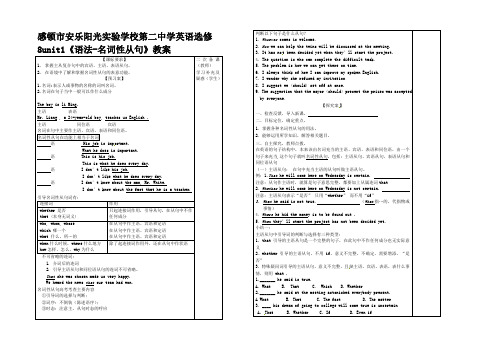
感顿市安乐阳光实验学校第二中学英语选修8unit1《语法-名词性从句》教案【课标要求】1.掌握主从复合句中的宾语、主语、表语从句。
2.在语境中了解和掌握名词性从句的表意功能。
【预习案】1.名词:表示人或事物的名称的词叫名词。
2.名词在句子当中一般可以作什么成分The boy is li Ming.主语表语Mr. Liang , a 24-year-old boy, teaches us English .主语同位语宾语名词在句中主要作主语、宾语、表语和同位语。
名词性从句在功能上相当于名词语 His job is imp ortant.What he does is important.语 This is his job.This is what he does every day.语I don’t like his job.I don’t like what he does every day.语I don’t know about the man, Mr. White.I don’t know about the fact that he is a teacher.引导名词性从句词有:连接词作用whether 是否that (本身无词义) 只起连接词作用,引导从句,在从句中不作任何成分who, whom, whose which 哪一个what 什么,所…的在从句中作主语、宾语和定语在从句中作主语、宾语和定语在从句中作主语、宾语和定语when什么时候,where什么地方how怎样、怎么,why为什么除了起连接词作用外,还在从句中作状语不可省略的连词:1. 介词后的连词2. 引导主语从句和同位语从句的连词不可省略。
That she was chosen made us very happy.We heard the news that our team had won.名词性从句高考考查主要内容①引导词的选择与判断;②词序:不倒装(陈述语序);③时态:注意主,从句时态的呼应二次备课(教师)学习补充及疑惑(学生)判断以下句子是什么从句?1.Whoever comes is welcome.2.How we can help the twins will be discussed at the meeting.3. It has no t been decided yet when they’ll start the project.4. The question is who can complete the difficult task.5. The problem is how we can get there on time.6. I always think of how I can improve my spoken English.7. I wonder why she refused my invitation8. I suggest we (should) set off at once.9. The suggestion that the mayor (should) present the prizes was acceptedby everyone.【探究案】一、检查反馈,导入新课。
高中英语 高考语法之名词性从句讲义
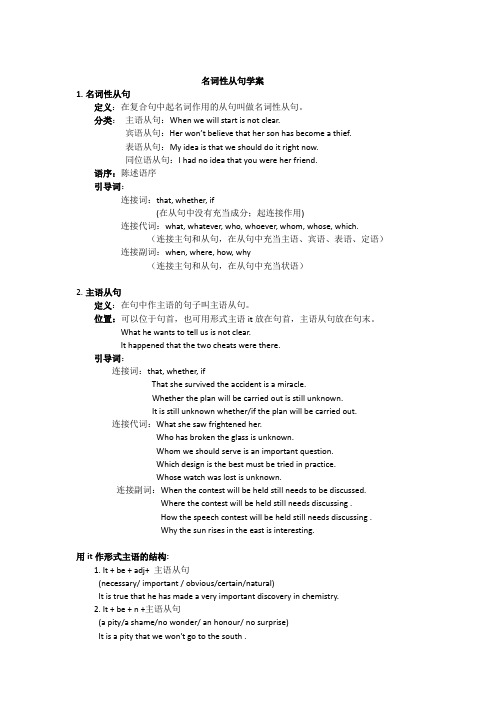
名词性从句学案1.名词性从句定义:在复合句中起名词作用的从句叫做名词性从句。
分类:主语从句:When we will start is not clear.宾语从句:Her won’t believe that her son has become a thief.表语从句:My idea is that we should do it right now.同位语从句:I had no idea that you were her friend.语序:陈述语序引导词:连接词:that, whether, if(在从句中没有充当成分;起连接作用)连接代词:what, whatever, who, whoever, whom, whose, which.(连接主句和从句,在从句中充当主语、宾语、表语、定语)连接副词:when, where, how, why(连接主句和从句,在从句中充当状语)2.主语从句定义:在句中作主语的句子叫主语从句。
位置:可以位于句首,也可用形式主语it放在句首,主语从句放在句末。
What he wants to tell us is not clear.It happened that the two cheats were there.引导词:连接词:that, whether, ifThat she survived the accident is a miracle.Whether the plan will be carried out is still unknown.It is still unknown whether/if the plan will be carried out.连接代词:What she saw frightened her.Who has broken the glass is unknown.Whom we should serve is an important question.Which design is the best must be tried in practice.Whose watch was lost is unknown.连接副词:When the contest will be held still needs to be discussed.Where the contest will be held still needs discussing .How the speech contest will be held still needs discussing .Why the sun rises in the east is interesting.用it作形式主语的结构:1. It + be + adj+ 主语从句(necessary/ important / obvious/certain/natural)It is true that he has made a very important discovery in chemistry.2. It + be + n +主语从句(a pity/a shame/no wonder/ an honour/ no surprise)It is a pity that we won't go to the south .3. It is/was done +主语从句(believed/ reported / said/ thought/expected /known)It is said that he has gone to shanghai.4. It vi +主语从句(appears/seems /happens/matters/ occurred to)It happened that the two cheats were there.主语从句中的虚拟语气在it作形式主语,that从句做真正主语的情况下,谓语动词可用虚拟语气“(should) +do”,如:It + be + n +主语从句It's a pity that we (should) not pass the exam.It + be + adj+ 主语从句It's important that we (should) study hard.It is/was done +主语从句(过去分词意为坚持、命令、建议、要求、督促)It's suggested that our students (should) help my patents do some housework.主语从句的主谓一致1. 单个的主语从句作主语时,谓语动词用单数形式。
高中英语-名词性从句-教案
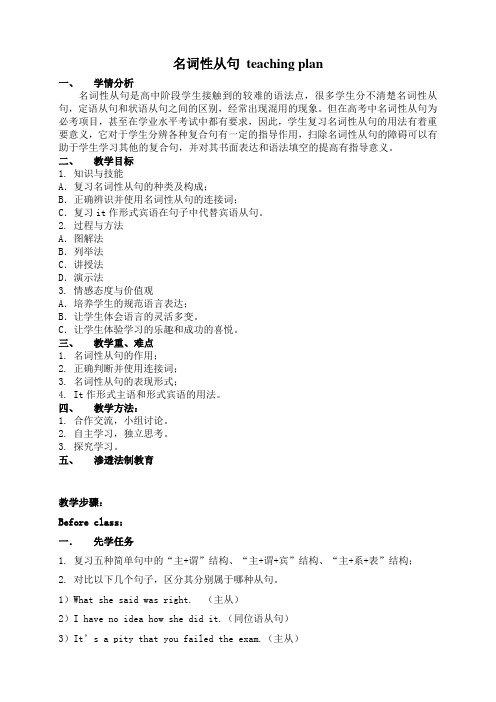
名词性从句teaching plan一、学情分析名词性从句是高中阶段学生接触到的较难的语法点,很多学生分不清楚名词性从句,定语从句和状语从句之间的区别,经常出现混用的现象。
但在高考中名词性从句为必考项目,甚至在学业水平考试中都有要求,因此,学生复习名词性从句的用法有着重要意义,它对于学生分辨各种复合句有一定的指导作用,扫除名词性从句的障碍可以有助于学生学习其他的复合句,并对其书面表达和语法填空的提高有指导意义。
二、教学目标1.知识与技能A.复习名词性从句的种类及构成;B.正确辨识并使用名词性从句的连接词;C.复习it作形式宾语在句子中代替宾语从句。
2. 过程与方法A.图解法B.列举法C.讲授法D.演示法3. 情感态度与价值观A.培养学生的规范语言表达;B.让学生体会语言的灵活多变。
C.让学生体验学习的乐趣和成功的喜悦。
三、教学重、难点1.名词性从句的作用;2.正确判断并使用连接词;3.名词性从句的表现形式;4.It作形式主语和形式宾语的用法。
四、教学方法:1.合作交流,小组讨论。
2.自主学习,独立思考。
3.探究学习。
五、渗透法制教育教学步骤:Before class:一.先学任务1.复习五种简单句中的“主+谓”结构、“主+谓+宾”结构、“主+系+表”结构;2.对比以下几个句子,区分其分别属于哪种从句。
1)What she said was right. (主从)2)I have no idea how she did it.(同位语从句)3)It’s a pity that you failed the exam.(主从)4)I’m sure that I will see you again.(宾从)5)What I want to know is when we’ll leave for Beijing.(主从、表从)6)Teachers consider it necessary that students should finish their homework.(宾从)3. 用适当的连接代词或连接副词填空。
如何在高中英语语法教案中正确使用名词
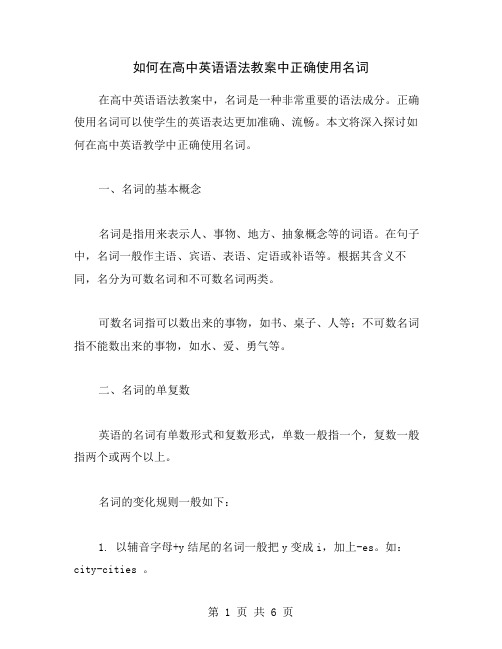
如何在高中英语语法教案中正确使用名词在高中英语语法教案中,名词是一种非常重要的语法成分。
正确使用名词可以使学生的英语表达更加准确、流畅。
本文将深入探讨如何在高中英语教学中正确使用名词。
一、名词的基本概念名词是指用来表示人、事物、地方、抽象概念等的词语。
在句子中,名词一般作主语、宾语、表语、定语或补语等。
根据其含义不同,名分为可数名词和不可数名词两类。
可数名词指可以数出来的事物,如书、桌子、人等;不可数名词指不能数出来的事物,如水、爱、勇气等。
二、名词的单复数英语的名词有单数形式和复数形式,单数一般指一个,复数一般指两个或两个以上。
名词的变化规则一般如下:1. 以辅音字母+y结尾的名词一般把y变成i,加上-es。
如:city-cities 。
2. 大多数名词在词尾加-s就可以表示复数。
如:book-books。
3. 以s、x、z、sh、ch结尾的名词,在词尾加-es。
如:box-boxes。
4. 以辅音字母加y结尾,字母y前是元音字母,直接加-s。
如:boy-boys。
5. 以元音字母加y结尾,直接加-s。
如:toy-toys。
6. 以f或fe结尾的名词,f或fe变成v,再加-es。
如:knife-knives。
7. 不规则变化的名词:man-men, woman-women, child-children 等。
三、名词的用法1. 主语名词主语名词一般位于句子的主语位置,表示该句子要谈论的主题。
在句子中,名词作主语时,其单复数形式必须与谓语动词一致。
例如:The boy runs fast.(这个男孩跑得快。
)The boys run fast.(这些男孩跑得快。
)2. 宾语名词宾语名词是动词的直接宾语。
其单复数形式也必须与谓语动词一致。
例如:I like apples.(我喜欢苹果。
)She always drinks milk.(她总是喝牛奶。
)3. 表语名词表语名词指的是紧随系动词后面作表语的名词。
高中英语语法 名词
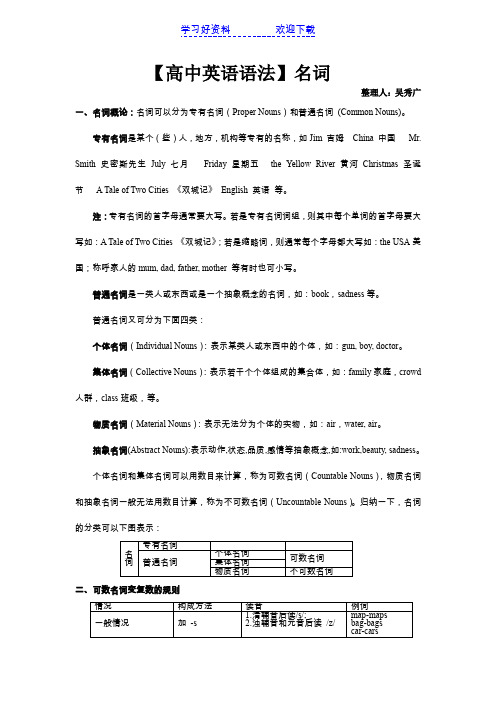
【高中英语语法】名词整理人:吴秀广一、名词概论:名词可以分为专有名词(Proper Nouns )和普通名词 (Common Nouns)。
专有名词是某个(些)人,地方,机构等专有的名称,如Jim 吉姆 China 中国 Mr. Smith 史密斯先生July 七月 Friday 星期五 the Yellow River 黄河Christmas 圣诞节 A Tale of Two Cities 《双城记》 English 英语 等。
注:专有名词的首字母通常要大写。
若是专有名词词组,则其中每个单词的首字母要大写如:A Tale of Two Cities 《双城记》;若是缩略词,则通常每个字母都大写如:the USA 美国;称呼家人的mum, dad, father, mother 等有时也可小写。
普通名词是一类人或东西或是一个抽象概念的名词,如:book ,sadness 等。
普通名词又可分为下面四类:个体名词(Individual Nouns ):表示某类人或东西中的个体,如:gun, boy, doctor 。
集体名词(Collective Nouns ):表示若干个个体组成的集合体,如:family 家庭,crowd 人群,class 班级,等。
物质名词(Material Nouns ):表示无法分为个体的实物,如:air ,water, air 。
抽象名词(Abstract Nouns):表示动作,状态,品质,感情等抽象概念,如:work,beauty, sadness 。
个体名词和集体名词可以用数目来计算,称为可数名词(Countable Nouns ),物质名词和抽象名词一般无法用数目计算,称为不可数名词(Uncountable Nouns )。
归纳一下,名词的分类可以下图表示: 名 词 专有名词 普通名词个体名词 可数名词 集体名词 物质名词 不可数名词二、可数名词变复数的规则情况 构成方法 读音 例词 一般情况 加 -s 1.清辅音后读/s/; 2.浊辅音和元音后读 /z/ map-maps bag-bags car-cars以s, h, ch, x等结尾的词加-es 读/iz/ bus-buseswatch-watchesce, se, ze, (d)ge等结尾的词加-s 读/iz/ license-licenses以辅音字母+y结尾的词变y 为i再加es 读/z/ baby---babies可数名词变复数的规则的几点说明(1) 以y结尾的专有名词,直接加词尾s变复数。
高三英语语法名词的复习教案

高三英语语法名词的复习教案一、教学目标1.让学生掌握名词的基本概念、分类和用法。
2.培养学生运用名词进行句子构建的能力。
3.提高学生对名词相关考点的理解和应用。
二、教学内容1.名词的概念和分类2.名词的数和格3.名词的用法4.名词相关考点三、教学过程1.导入师:同学们,我们今天来复习一下名词。
请问大家知道名词是什么吗?生:名词就是表示人、事物、地点、抽象概念等名称的词。
师:很好!那我们就从名词的概念和分类开始吧。
2.名词的概念和分类师:名词分为两大类:可数名词和不可数名词。
可数名词有单数和复数形式,而不可数名词没有复数形式。
请同学们举例说明。
生1:可数名词如:book,table,apple等。
生2:不可数名词如:water,r,rice等。
师:很好!我们来看一下名词的数和格。
3.名词的数和格师:名词的数分为单数和复数。
单数名词通常加“-s”或“-es”变为复数。
但有些名词变复数时需要特殊变化,比如:childchildren,manmen等。
名词的格分为三种:主格、宾格和属格。
主格用于名词作主语,宾格用于名词作宾语,属格用于表示所有关系。
师:请同学们用所学的名词,分别构成单数和复数形式,并说明其格。
生1:bookbooks(主格:Thebookisonthetable.宾格:Ilikethisbook.属格:Thisismybook.)生2:childchildren(主格:Thechildrenareplaying.宾格:Iseethechildren.属格:Thechildren'sbooksarehere.)4.名词的用法师:名词在句子中的用法有很多,比如作主语、宾语、表语、定语等。
请同学们用所学的名词,分别构成不同成分的句子。
生1:主语:Thecatissleeping.生2:宾语:Iboughtabook.生3:表语:Sheisateacher.生4:定语:Thegirl'sbagisred.5.名词相关考点师:在高考英语中,名词的考点主要包括名词的单复数、格、所有格、同义词辨析等。
高中英语 语法过关名词辅导课件
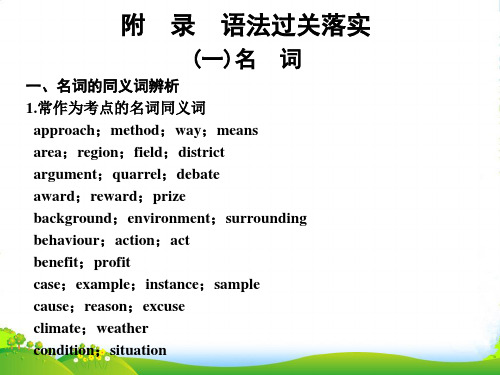
•11、凡为教者必期于达到不须教。对人以诚信,人不欺我;对事以诚信,事无不成。 •12、首先是教师品格的陶冶,行为的教育,然后才是专门知识和技能的训练。 •13、在教师手里操着幼年人的命运,便操着民族和人类的命运。2022/1/182022/1/18January 18, 2022 •14、孩子在快乐的时候,他学习任何东西都比较容易。 •15、纪律是集体的面貌,集体的声音,集体的动作,集体的表情,集体的信念。 •16、一个人所受的教育超过了自己的智力,这样的人才有学问。 •17、好奇是儿童的原始本性,感知会使儿童心灵升华,为其为了探究事物藏下本源。2022年1月2022/1/182022/1/182022/1/181/18/2022 •18、人自身有一种力量,用许多方式按照本人意愿控制和影响这种力量,一旦他这样做,就会影响到对他的教育和对他发生作用的环境。 2022/1/182022/1/18
附 录 语法过关落实
(一)名 词
一、名词的同义词辨析 1.常作为考点的名词同义词
approach;method;way;means area;region;field;district argument;quarrel;debate award;reward;prize background;environment;surrounding behaviour;action;act benefit;profit case;example;instance;sample cause;reason;excuse climate;weather condition;situation
【例3】 “I don’t think it’s my ________ that the TV blew up. I just turned it on, that’s all,” said the boy. A.error B.mistake C.fault D.duty [解题关键] 解此题的关键是要弄清楚名词的惯用法。error, mistake和fault都可译为“错误”,但it is one’s fault是惯用法。 如: It’s not my fault./Whose fault is it that we’re late?根据题意“我 认 为电视机爆炸不是我的错,我只是打开了电视,仅此而已。”可 知答案为C。 二、名词与动词的搭配
高中英语语法教案:抽象名词和具体名词的区别

高中英语语法教案:抽象名词和具体名词的区别Abstract Nouns and Concrete Nouns: Understanding the DifferenceEnglish grammar can be quite challenging to understand, especially for non-native speakers. One aspect of English grammar that is often confusing for many learners is the difference between abstract nouns and concrete nouns. This lesson plan aims to break down the differences between these two types of nouns and provide examples to help studentsbetter understand their usage.I. Objectives:By the end of this lesson, students will be able to:1. Define and identify concrete and abstract nouns.2. Develop an understanding of how these nouns are usedin sentences.3. Write sentences using both concrete and abstract nouns.II. Materials:1. Whiteboard and marker2. Worksheet with examples of concrete and abstract nouns3. Chart with examples of concrete and abstract nouns for reference4. Sample sentences for students to identify the type of noun usedIII. Procedure:1. Introduction:Begin the lesson by asking students if they know what a noun is. Write the definition of a noun on the whiteboard: a person, place, thing, or idea. Next, introduce the concept of abstract and concrete nouns. Tell students that nouns can be divided into two categories: concrete and abstract.2. Concrete Nouns:Explain to students that a concrete noun is a noun that can be perceived by one of the five senses (sight, sound, taste, touch, or smell). Write down examples such as apple, book, car, and dog. Show them pictures of concrete nouns to help with their understanding. For instance, you can show a picture of a red apple, a book with its cover, a car in a garage, or a dog running around.3. Abstract Nouns:Next, explain to students that an abstract noun is a noun that cannot be perceived by the senses. These are ideas, concepts, and emotions. Write down examples such as love, fear, happiness, and courage. Show them examples of abstract nouns in context by using sentences such as "His love for his family is unconditional" and "The fear of public speaking is a common one."4. Practice:Hand out the worksheet and have students identify which nouns are concrete and which are abstract. Then, have them write down sentences using both concrete and abstract nouns. Have students share their answers with the class and ask them to explain why they chose to use a certain type of noun.5. Reinforcement:Finally, reinforce the lesson by asking students to identify which type of noun is used in sample sentences. Provide students with a list of sample sentences and have them identify whether the noun is concrete or abstract. For example, "The sunlight warmed his face" is a concrete nounbecause sunlight can be perceived by sight and can warm the skin.IV. Conclusion:In conclusion, explain to students that understanding the difference between concrete and abstract nouns is crucial because it helps to communicate more effectively. The use of concrete and abstract nouns adds depth, emotion, and meaning to our sentences, and helps us create a more vivid picture in the reader's mind.V. Homework:For homework, have students write a paragraph that includes at least three concrete nouns and three abstract nouns.VI. Assessment:Assess students' understanding of concrete and abstract nouns by reviewing their completed worksheet and theirwritten paragraph.VII. Follow-up Activities:To reinforce the lesson, have students perform online exercises or play games that allow them to practiceidentifying and using concrete and abstract nouns. Provide feedback and support as needed to reinforce their learning.By the end of this lesson, students should have a solid grasp of how to distinguish between concrete and abstract nouns and how to use them in their writing. As they continue to practice these skills, they will become more confident and articulate in communicating their ideas.。
高中英语语法名词讲解
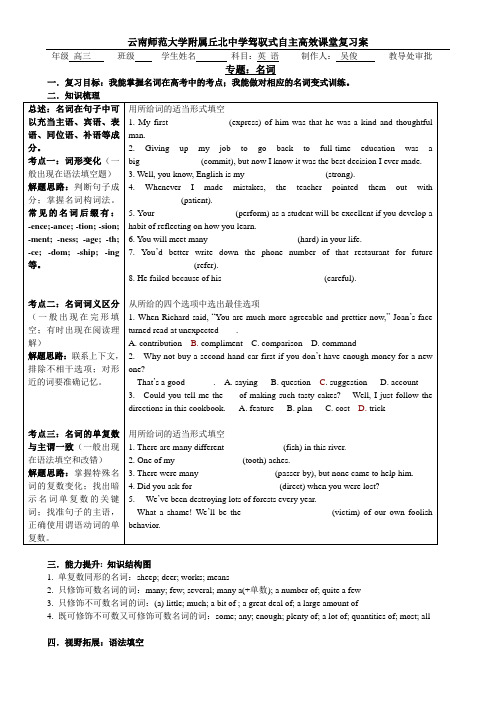
年级高三班级学生姓名科目:英语制作人:吴俊教导处审批专题:名词一.复习目标:我能掌握名词在高考中的考点;我能做对相应的名词变式训练。
二.知识梳理三.能力提升: 知识结构图1. 单复数同形的名词:sheep; deer; works; means2. 只修饰可数名词的词:many; few; several; many a(+单数); a number of; quite a few3. 只修饰不可数名词的词:(a) little; much; a bit of ; a great deal of; a large amount of4. 既可修饰不可数又可修饰可数名词的词:some; any; enough; plenty of; a lot of; quantities of; most; all 四.视野拓展:语法填空Sometimes Chinese English teachers 1._____________(puzzle) by such questions as “Can you tell me how to read smoothly?”“Have you got any skills in reading comprehension?" Actually, many of the teachers can't give students 2.________ efficient way to deal with reading.Anyway,3.________ often simply say, "Read more and practice more, and you 4.______ (get) more experience in reading comprehension." Frankly, these teachers' good 5.________ (suggest) are only helpful to arouse students' interest in reading 6.________ not helpful to deal with the questions in the examinations of reading comprehension. Personally, I think the skill for reading comprehension should be based 7.________ the knowledge of English writing. Since the English passages are written under some rules or principles, the science of reading and understanding may have a close relationship with writing. Reading comprehension can't be independent from the knowledge of writing. So 8.________ (do) better in reading comprehension, we should learn the knowledge of writing, study 9.________ questions are designed and the relationship 10.________ questions and the reading materials.五. 巩固诊断1. Just get out of there, and whatever you’re doing, do it to the best of your ________________(able).2. Take a look at the Learning Guide for some additional ____________________(explain).3. I’ve got to give you some________________(advise) to help you with your attitude.4. The jobs of the future will demand problem-solving skills and creative ___________________(approach) to work.5. Those suffer from headache will find they get ______from this medicine.A. reliefB. safetyC. defenseD. shelter6. James took the magazines off the little table to make ______for the television.A. roomB. areaC. fieldD. position7. The doctor is skilled at treating heart trouble and never accepts any gift from his patients, so he has a very good______. A. expectation B. reputation C. contribution D. civilization8. The school advisers help you talk through your problems but they don’t give you any direct_______.A. solutionB. targetC. measureD. function9. She has a ______of playing with her hair when she’s nervous.A. senseB. practiceC. customD. habit10. He was a much older player but he had the great ______of experience.A. interestB. successC. advantageD. honor11. The increase in home computers means that families now have much easier ______to information.A. measureB. accessC. wayD. method12. With inspiration from other food cultures, American food culture can take a _____for the better.A. shareB. chanceC. turnD. lead六.补漏积典1.such2. an3. they4. will get5. suggestions6. but7. on8. to do9. how 10. between。
高中英语语法教案及配套练习

高中英语语法教案(全套)及配套练习教案章节:一、动词时态教学目标:1. 理解动词时态的概念和重要性。
2. 掌握一般现在时、一般过去时、一般将来时、现在进行时、过去进行时、现在完成时和过去完成时的用法。
3. 能够正确运用动词时态进行句子构建和交流。
教学内容:1. 动词时态的概念和分类。
2. 一般现在时的用法,如:I like apples.3. 一般过去时的用法,如:I visited the museum yesterday.4. 一般将来时的用法,如:I will travel to Japan next year.5. 现在进行时的用法,如:I am reading a book now.6. 过去进行时的用法,如:She was watching TV yesterday evening.7. 现在完成时的用法,如:I have finished my homework.8. 过去完成时的用法,如:She had already eaten breakfast before I arrived. 教学活动:1. 引入动词时态的概念,让学生理解动词时态的重要性。
2. 通过例句和练习,讲解和巩固各个动词时态的用法。
3. 小组活动,让学生相互练习使用动词时态进行句子构建和交流。
配套练习:1. 选择题:判断下列句子中动词时态的使用是否正确。
2. 填空题:根据语境,选择合适的动词时态填空。
3. 翻译题:将下列句子翻译成英文,注意使用正确的动词时态。
教案章节:二、名词和冠词教学目标:1. 理解名词的概念和重要性。
2. 掌握可数名词和不可数名词的用法。
3. 掌握定冠词和不定冠词的用法。
4. 能够正确运用名词和冠词进行句子构建和交流。
教学内容:1. 名词的概念和分类。
2. 可数名词和不可数名词的用法,如:apple (可数名词)和water (不可数名词)。
3. 定冠词和不定冠词的用法,如:The cat (定冠词)和a cat (不定冠词)。
英语语法.高中版-名词-含专项练习
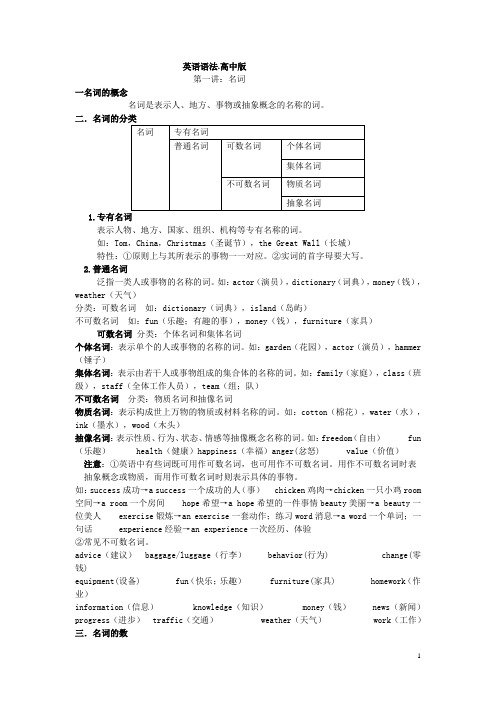
英语语法.高中版第一讲:名词一名词的概念名词是表示人、地方、事物或抽象概念的名称的词。
二.名词的分类名词专有名词普通名词可数名词个体名词集体名词不可数名词物质名词抽象名词1.专有名词表示人物、地方、国家、组织、机构等专有名称的词。
如:Tom,China,Christmas(圣诞节),the Great Wall(长城)特性:①原则上与其所表示的事物一一对应。
②实词的首字母要大写。
2.普通名词泛指一类人或事物的名称的词。
如:actor(演员),dictionary(词典),money(钱),weather(天气)分类:可数名词如:dictionary(词典),island(岛屿)不可数名词如:fun(乐趣;有趣的事),money(钱),furniture(家具)可数名词分类:个体名词和集体名词个体名词:表示单个的人或事物的名称的词。
如:garden(花园),actor(演员),hammer (锤子)集体名词:表示由若干人或事物组成的集合体的名称的词。
如:family(家庭),class(班级),staff(全体工作人员),team(组;队)不可数名词分类:物质名词和抽像名词物质名词:表示构成世上万物的物质或材料名称的词。
如:cotton(棉花),water(水),ink(墨水),wood(木头)抽像名词:表示性质、行为、状态、情感等抽像概念名称的词。
如:freedom(自由)fun (乐趣)health(健康)happiness(幸福)anger(忿怒) value(价值)注意:①英语中有些词既可用作可数名词,也可用作不可数名词。
用作不可数名词时表抽象概念或物质,而用作可数名词时则表示具体的事物。
如:success成功→a success一个成功的人(事) chicken鸡肉→chicken一只小鸡room 空间→a room一个房间hope希望→a hope希望的一件事情beauty美丽→a beauty一位美人exercise锻炼→an exercise一套动作;练习word消息→a word一个单词;一句话experience经验→an experience一次经历、体验②常见不可数名词。
高中英语语法名词教案

There isn’t any orange in the bottle.
Have you got any tea?
3)any和some也可以作代词用,表示“一些”。any多用于疑问句或否定句中,some多用于肯定句中。
代词专项复习教案
姓名
冉智慧
年级
应用部2年级
计划课时数
5节
课题
英语语法复习专项-----代词
教
学
目
标
1、代词的概念和作用
2、代词的分类:人称代词、物主代词、指示代词、反身代词、相互代词、疑问代词、关系代词和不定代词
3、了解代词的种类和正确选择使用不同种类的代词
难
点
重
点
1、形容词性物主代词和名词性物主代词的正确使用
Look!Some of the students are cleaning the library.
。Some rice in the bag has been sold out.
2)any多用于疑问句、条件句和否定句中,表示“一些,任何”用作形容词时,后面可以接①不可数名词+单数动词;②可数名词+复数动词。
则指时间和空间上较远的事物或人,例如:
This is a pen and that is a pencil.
We are busy these days.
In those days the workers had a hard time.
2.有时that和those指前面讲到过的事物,this和these则是指下面将要讲
英语中用来表示“我自己”,“你自己”,“他自己”,“我们自己”,“你们自己”
高中英语语法教案名词
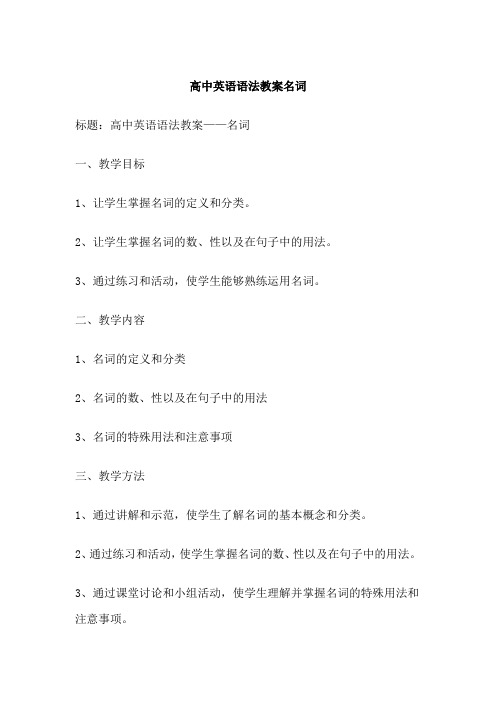
高中英语语法教案名词标题:高中英语语法教案——名词一、教学目标1、让学生掌握名词的定义和分类。
2、让学生掌握名词的数、性以及在句子中的用法。
3、通过练习和活动,使学生能够熟练运用名词。
二、教学内容1、名词的定义和分类2、名词的数、性以及在句子中的用法3、名词的特殊用法和注意事项三、教学方法1、通过讲解和示范,使学生了解名词的基本概念和分类。
2、通过练习和活动,使学生掌握名词的数、性以及在句子中的用法。
3、通过课堂讨论和小组活动,使学生理解并掌握名词的特殊用法和注意事项。
四、教学步骤1、导入新课:让学生回答一些包含名词的简单问题,引导学生思考名词在语言中的作用。
2、讲解名词的定义和分类:通过例子和图示,使学生理解名词的定义和分类。
3、练习名词的数、性以及在句子中的用法:通过填空、改错等练习,使学生掌握名词的数、性以及在句子中的用法。
4、讲解名词的特殊用法和注意事项:通过例子和讲解,使学生了解名词的特殊用法和注意事项。
5、小组活动:让学生分组讨论一些名词的用法和注意事项,并在课堂上进行交流和分享。
6、课堂小结:回顾本节课的重点内容和知识点,强调名词的重要性,鼓励学生在语言实践中多加运用。
7、布置作业:布置一些与名词相关的练习题和阅读材料,以巩固和拓展学生的知识和能力。
五、教学评估1、通过课堂练习和小组活动,评估学生对名词的掌握程度。
2、通过课后作业和考试,评估学生对名词的运用能力。
3、通过学生自评和互评,了解学生对名词的学习体验和感受。
六、教学反思1、反思教学方法的有效性,是否能够达到教学目标。
2、反思教学过程中的优点和不足,如何改进和提高教学质量。
3、反思学生的学习状态和反馈,如何更好地满足学生的学习需求。
总之,通过本次教案的实施,我们希望能够让学生更好地掌握英语语法中的名词,为他们的英语学习和语言实践打下坚实的基础。
我们也需要在反思和改进中不断提高教学质量,为学生提供更好的学习体验和服务。
高中英语语法名词本文将为大家详细介绍高中英语语法中的一些重要名词,包括句子结构、主语、谓语、宾语、定语、状语等。
英语名词的教案(1)
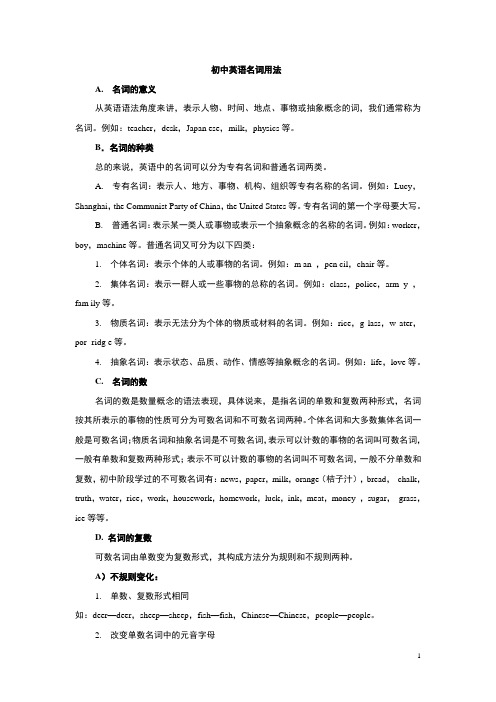
初中英语名词用法A. 名词的意义从英语语法角度来讲,表示人物、时间、地点、事物或抽象概念的词,我们通常称为名词。
例如:teacher,desk,Japan ese,milk,physics等。
B.名词的种类总的来说,英语中的名词可以分为专有名词和普通名词两类。
A. 专有名词:表示人、地方、事物、机构、组织等专有名称的名词。
例如:Lucy,Shanghai,the Communist Party of China,the United States等。
专有名词的第一个字母要大写。
B. 普通名词:表示某一类人或事物或表示一个抽象概念的名称的名词。
例如:worker,boy,machine等。
普通名词又可分为以下四类:1. 个体名词:表示个体的人或事物的名词。
例如:m an ,pen cil,chair等。
2. 集体名词:表示一群人或一些事物的总称的名词。
例如:class,police,arm y ,fam ily等。
3. 物质名词:表示无法分为个体的物质或材料的名词。
例如:rice,g lass,w ater,por- ridg e等。
4. 抽象名词:表示状态、品质、动作、情感等抽象概念的名词。
例如:life,love等。
C. 名词的数名词的数是数量概念的语法表现,具体说来,是指名词的单数和复数两种形式,名词按其所表示的事物的性质可分为可数名词和不可数名词两种。
个体名词和大多数集体名词一般是可数名词;物质名词和抽象名词是不可数名词,表示可以计数的事物的名词叫可数名词,一般有单数和复数两种形式;表示不可以计数的事物的名词叫不可数名词,一般不分单数和复数,初中阶段学过的不可数名词有:news,paper,milk,orange(桔子汁),bread,chalk,truth,water,rice,work,housework,homework,luck,ink,meat,money ,sugar,grass,ice等等。
- 1、下载文档前请自行甄别文档内容的完整性,平台不提供额外的编辑、内容补充、找答案等附加服务。
- 2、"仅部分预览"的文档,不可在线预览部分如存在完整性等问题,可反馈申请退款(可完整预览的文档不适用该条件!)。
- 3、如文档侵犯您的权益,请联系客服反馈,我们会尽快为您处理(人工客服工作时间:9:00-18:30)。
高中英语语法教案名词高中英语语法教案名词(一)概述名词是表示人、地方、事物或抽象概念名称的词,可以说名词是万物之名称。
它们可以是:人的名字 li ming, tom 地方名称 china, london 职业称呼 teacher, doctor 物品名称 pencil,dictionary 行为名称 study, invention 抽象概念 history, grammar (二)普通名词和专有名词 1.普通名词凡不属于特定的人名、地名、事物名称或概念名称的名词,都属于普通名词。
这类名词在所有的名词中占绝大多数。
普通名词大致有以下四种类型: 1)个体名词个体名词指作为个体而存在的人或物。
可以指具体的人或物,例如: he has two aunts. 他有两个姑姑。
most classrooms have computers. 多数教室里都有电脑。
也可指抽象东西,例如:we’ve lived here for twenty years. 我们在这里住了二十年了。
i had a dream last night 我昨晚做了一个梦。
个体名词有复数形式,如:weeks, problems;单数形式可以和a/an连用,如:a week, a problem, an old man. 2)集体名词集体名词表示由个体组成的集体,下面是一些常见的集体名词: family(家,家庭) army(军队) company(公司;全体船员) enemy(敌人) government (政府) group(小组,团体) public(公众) team(队;组) police(警方)作单数看待作复数看待 his family isn't large. 他家人不多。
the government is planning to build a dam here. 政府打算在这里建一座水坝。
the public was unlikely to support it. 公众支持它的可能性不大。
his family are all music lovers. 他家的人都喜欢音乐。
the government are discussing the plan. 政府在讨论这个计划。
the public were deceived by the newspaper. 公众受到报纸的蒙骗。
集体名词有时作单数看待,有时作复数看待。
一般说来,视为整体时作单数看待,想到它的成员时作复数看待:例如:有的集体名词通常用作单数,例如: our company is sending him to work in berlin. 我们公司将派他去柏林工作。
有的集体名词多作复数看待。
例如: the police are looking for him. 警察正在找他。
3)物质名词物质名词指无法分为个体的东西,我们学过的常见的物质名词有: beer, cloth, coal, coffee, coke, cotton, ice, ink, jam, juice, meat, medicine, metal, milk, oil paper, rain,salad, salt, sand, snow, soup, steel, sugar, tea, water, wine, wood, wool 等。
一般说来,物质名词是不可数折,因而没有复数形式。
但有一些特殊情况:a.有些物质名词可用作可数名词,表示“一份”,“一杯”: tree beers, please. 请来三杯啤酒。
a chocolate ice-cream for me. 给我一份巧克力冰淇淋。
b.有此物质名词可作可数名词,表示“一种”: it was a special tea which tasted of orange blossoms. 这是一种特别的茶,有桔子花叶。
it was a delicious wine. 那是一种美味的红酒。
c.个别物质名词可用于复数形式或有特殊意义:345678910111314151617181920222324252627282930313233343536373839404142 434445464748495051525354555657585960616263646566676869707172737475767 7787980812020-05-11高中英语语法教案名词(一)概述名词是表示人、地方、事物或抽象概念名称的词,可以说名词是万物之名称。
它们可以是:人的名字 li ming, tom 地方名称 china, london 职业称呼 teacher, doctor 物品名称 pencil,dictionary 行为名称 study, invention 抽象概念 history, grammar (二)普通名词和专有名词 1.普通名词凡不属于特定的人名、地名、事物名称或概念名称的名词,都属于普通名词。
这类名词在所有的名词中占绝大多数。
普通名词大致有以下四种类型: 1)个体名词个体名词指作为个体而存在的人或物。
可以指具体的人或物,例如: he has two aunts. 他有两个姑姑。
most classrooms have computers. 多数教室里都有电脑。
也可指抽象东西,例如:we’ve lived here for twenty years. 我们在这里住了二十年了。
i had a dream last night 我昨晚做了一个梦。
个体名词有复数形式,如:weeks, problems;单数形式可以和a/an连用,如:a week, a problem, an old man. 2)集体名词集体名词表示由个体组成的集体,下面是一些常见的集体名词: family(家,家庭) army(军队) company(公司;全体船员) enemy(敌人) government (政府) group(小组,团体) public(公众) team(队;组) police(警方)作单数看待作复数看待 his family isn't large. 他家人不多。
thegovernment is planning to build a dam here. 政府打算在这里建一座水坝。
the public was unlikely to support it. 公众支持它的可能性不大。
his family are all music lovers. 他家的人都喜欢音乐。
the government are discussing the plan. 政府在讨论这个计划。
the public were deceived by the newspaper. 公众受到报纸的蒙骗。
集体名词有时作单数看待,有时作复数看待。
一般说来,视为整体时作单数看待,想到它的成员时作复数看待:例如:有的集体名词通常用作单数,例如: our company is sending him to work in berlin. 我们公司将派他去柏林工作。
有的集体名词多作复数看待。
例如: the police are looking for him. 警察正在找他。
3)物质名词物质名词指无法分为个体的东西,我们学过的常见的物质名词有: beer, cloth, coal, coffee, coke, cotton, ice, ink, jam, juice, meat, medicine, metal, milk, oil paper, rain, salad, salt, sand, snow, soup, steel, sugar, tea, water, wine, wood, wool 等。
一般说来,物质名词是不可数折,因而没有复数形式。
但有一些特殊情况:a.有些物质名词可用作可数名词,表示“一份”,“一杯”: tree beers, please. 请来三杯啤酒。
a chocolate ice-cream for me. 给我一份巧克力冰淇淋。
b.有此物质名词可作可数名词,表示“一种”: it was a special tea which tasted of orange blossoms. 这是一种特别的茶,有桔子花叶。
it was a delicious wine. 那是一种美味的红酒。
c.个别物质名词可用于复数形式或有特殊意义:345678910111314151617181920222324252627282930313233343536373839404142 434445464748495051525354555657585960616263646566676869707172737475767 7787980812020-05-11高中英语语法教案名词(一)概述名词是表示人、地方、事物或抽象概念名称的词,可以说名词是万物之名称。
它们可以是:人的名字 li ming, tom 地方名称 china, london 职业称呼 teacher, doctor 物品名称 pencil,dictionary 行为名称 study, invention 抽象概念 history, grammar (二)普通名词和专有名词 1.普通名词凡不属于特定的人名、地名、事物名称或概念名称的名词,都属于普通名词。
这类名词在所有的名词中占绝大多数。
普通名词大致有以下四种类型: 1)个体名词个体名词指作为个体而存在的人或物。
可以指具体的人或物,例如: he has two aunts. 他有两个姑姑。
most classrooms have computers. 多数教室里都有电脑。
也可指抽象东西,例如:we’ve lived here for twenty years. 我们在这里住了二十年了。
i had a dream last night 我昨晚做了一个梦。
个体名词有复数形式,如:weeks, problems;单数形式可以和a/an连用,如:a week, a problem, an old man. 2)集体名词集体名词表示由个体组成的集体,下面是一些常见的集体名词: family(家,家庭) army(军队) company(公司;全体船员) enemy(敌人) government (政府) group(小组,团体) public(公众) team(队;组) police(警方)作单数看待作复数看待 his family isn't large. 他家人不多。
